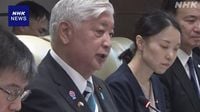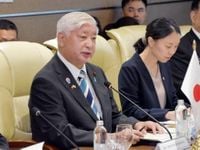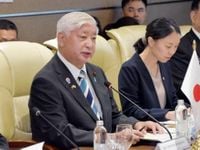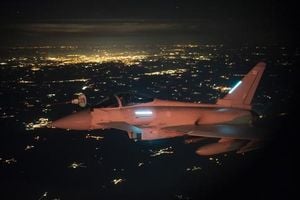On May 4, 2025, Japanese Defense Minister Minoru Kihara met with State Minister for National Defense of Sri Lanka, Jayasekera, near Colombo, the largest city in the country. The meeting marked a significant moment in Japan-Sri Lanka relations, with both parties agreeing to strengthen cooperation between the Self-Defense Forces of Japan and the Sri Lankan military. This collaboration aims to enhance stability in the Indo-Pacific region.
This visit is particularly noteworthy as it represents the second time since 2018 that a Japanese defense minister has traveled to Sri Lanka, emphasizing the importance Japan places on its relationship with this strategically located nation. Sri Lanka sits at a critical juncture in the sea lane that connects the Middle East and Asia, making it a focal point in Japan's defense strategy.
During the discussions, Kihara expressed deep concerns regarding China's increasing assertiveness in the East and South China Seas. He stated, "There is significant concern regarding attempts to unilaterally change the status quo." This comment underscores Japan's apprehension about China's expanding influence in the region, particularly as it relates to maritime security.
Both leaders agreed to promote various forms of cooperation, including disaster response, maritime security, naval aviation, rescue operations, and medical transport. They also highlighted the importance of enhancing exchanges of young personnel responsible for defense, aiming to build a robust partnership that can respond effectively to regional challenges.
Kihara's visit included a meeting with Sri Lankan Prime Minister Amarasuriya, where they confirmed the importance of strengthening a free and open maritime order. This dialogue reflects Japan's commitment to ensuring that international waters remain accessible and secure for all nations.
Looking ahead, Kihara is scheduled to meet with the Indian Defense Minister on May 5, 2025, in India. This meeting will focus on further discussions regarding defense cooperation, including the establishment of a consultation body for unit operations and the expansion of joint training exercises.
In a statement to reporters following his meetings, Kihara emphasized the significance of Sri Lanka as a vital partner in achieving a free and open Indo-Pacific. He remarked, "Sri Lanka is positioned at a key point in the sea lane and is an important partner for realizing a free and open Indo-Pacific. We will work to strengthen cooperation in various fields to ensure regional peace and stability."
The partnership between Japan and Sri Lanka is not just about military cooperation; it also extends to cultural and educational exchanges. Both nations agreed on the implementation of seminars on maritime law led by Japanese experts and the initiation of exchange programs between the National Defense Academy of Japan and the Sri Lankan National Defense University. These initiatives are designed to foster mutual understanding and strengthen ties between the two countries.
As Japan continues to navigate its role in the Indo-Pacific region, the strengthening of ties with Sri Lanka is seen as a strategic move to counterbalance China's growing influence. The cooperation between the Self-Defense Forces and the Sri Lankan military is expected to play a crucial role in addressing various security challenges in the region.
In conclusion, Kihara's visit to Sri Lanka represents a significant step in enhancing Japan's defense posture in the Indo-Pacific. By fostering deeper cooperation with Sri Lanka, Japan aims to ensure a stable and secure maritime environment that benefits all nations in the region.






